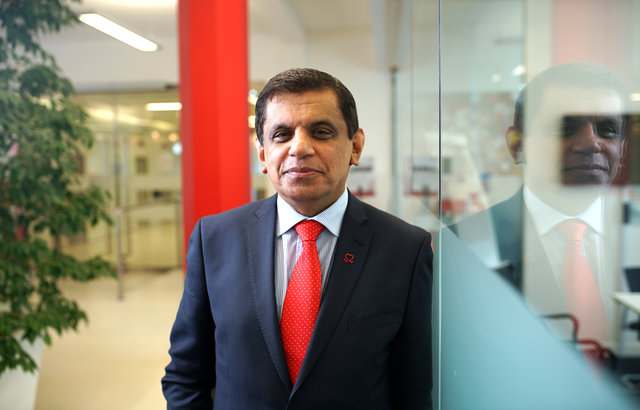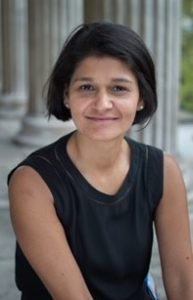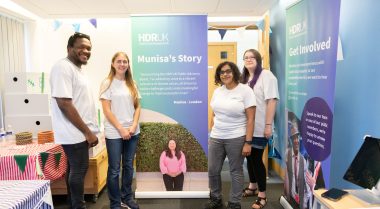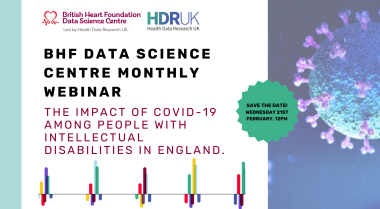BHF Data Science Centre Research Showcase - Report
8 June 2022
The British Heart Foundation (BHF) Data Science Centre Research Showcase was a virtual event in March 2022, illustrating the Centre’s broad range of activities to enable access to, and use of whole-population scale multimodal data, advanced analytics and technological advances to further the understanding of cardiovascular health and improve health outcomes. Read on to find out what happened during the event.

Professor Sir Nilesh Samani
The event was introduced by Professor Sir Nilesh Samani, Medical Director, BHF, and Professor Andrew Morris, Director, HDR UK, who gave a background on the partnership between the BHF and HDR UK that led to the formation of the BHF Data Science Centre and the successful working relationship that underpins its ground-breaking work. BHF Data Science Centre Operations Director Dr Lynn Morrice then gave a brief introduction about the centre and its thematic areas of work.
Kelvin Pitman, a patient with lived experience of cardiovascular disease and a public contributor to the BHF Data Science Centre Oversight Committee, offered his perspective that health data is an emotive subject and detailed the importance of researchers considering patients’ concerns and time.
Keynote: Creating the future of healthcare
Dr Doug Gurr, Chair of the BHF and Director of the Natural History Museum
Dr Gurr discussed the future of health data to improve outcomes. Cardiovascular outcomes, such as age-adjusted mortality rates, have improved dramatically in the last 60 years. However, the rapid rate of progress has recently stalled. Computational advances in recent years mean we can now solve complex healthcare-related problems by integrating data science with clinical medicine. This should allow a return to a faster rate of improvement in cardiovascular disease outcomes, benefitting individuals’ health and healthcare systems globally. Three critical components were discussed: data, modelling expertise, and computing power. The talk concluded by discussing the importance of effectively communicating and building trust with the public.
How large-scale health data is used in cardiovascular research
Chair: Dr Angela Wood, University Lecturer in Biostatistics, University of Cambridge
Dr Wood presented work on the CVD-COVID-UK/COVID-IMPACT programme, which aims to understand the relationship of COVID-19 with cardiovascular and other diseases using linked UK-wide electronic health record datasets accessed within secure Trusted Learning Environments (TREs).
Dr Tom Bolton and John Nolan (Senior Health Data Scientists, BHF Data Science Centre, presented the challenges of working with big data and their work to improve the path from raw to research-ready data by providing guidance, code for exploration, and a curated, harmonised layer of cleaned, processed data that can be used across multiple projects.
Specialist registrar in anaesthetics and intensive care, Dr Chris Tomlinson, explored the importance of linking data sources together to improve the ascertainment and completeness of COVID-19 phenotypes, which has led to the characterisation of previously unobserved subgroups, e.g. patients receiving ventilation outside intensive care units.
Using patient records from 48 million people, provided by the English and Welsh TREs, Dr Venexia Walker, Research Fellow in Medical Statistics and Health Data Science at the University of Bristol, showed that there is an increased risk of vascular disease soon after a COVID-19 diagnosis, lasting for many months, and an increased risk of intracranial venous thrombosis after vaccination with the AstraZeneca vaccine in those younger than 70 years of age.
Finally, Dr Caroline Dale, Senior Research Fellow, UCL, used changes in dispensing of cardiovascular disease (CVD) medicines to quantify the indirect impact of the pandemic on CVD management and prevention. The findings showed 24,000 fewer individuals beginning antihypertensive medications per month, which may soon lead to 14,000 additional CVD events.
Keynote: South Asian White European differences in life course cardiometabolic risk: an example from Bradford of linking cohorts and routine health and social data
Professor Deborah Lawlor, BHF Professor of Cardiovascular Science and Professor of Epidemiology, University of Bristol
Professor Lawlor discussed the stark inequalities in perinatal mortality in the city of Bradford, particularly in South Asian (SA) women, prompting the creation of the Born in Bradford (BiB) cohort. It has since expanded to incorporate various health and wider determinants of health data such as genetic, green space, and social data. A key driver of the success of the BiB was attributed to the continued close collaboration between researchers and patients.
Understanding cardiovascular disease with imaging
Chair: Professor Cathie Sudlow, Director, BHF Data Science Centre
Unstructured data, specifically imaging, is one of the centre’s six thematic areas and is led by Dr Michelle Williams, Associate Director of Imaging Data, BHF Data Science Centre, Senior Clinical Lecturer and Honorary Radiology Consultant, University of Edinburgh and NHS Lothian.

The session began with a talk from Professor Declan O’Regan, Chair in Imaging at the London Institute of Medical Sciences, in which he highlighting the importance of population-based studies and the power of large-scale studies for answering key research questions. The UK Biobank data resource was discussed alongside the principles of computational modelling, risk prediction, and early diagnosis using cardiac MRI data. It was followed by a presentation by Dr Jorge Cardoso, Reader in Artificial Medical Intelligence, and CTO of the London AI Centre, which focused on artificial intelligence systems, federated learning and the critical issues involved.
The session concluded with a talk given by Professor Marc Dweck from the University of Edinburgh), describing the current modalities being used in cardiovascular imaging and the vital diagnostic areas each one covers. An informative and concise description of the advantages of each modality (echocardiography, CT, MRI, PET/CT and molecular imaging) for heart disease diagnosis was provided.
Data-Enabled Trials: learning from trials outside cardiovascular disease
Chair: Professor Matthew Sydes, Associate Director of Data-enabled Clinical Trials, BHF Data Science Centre, and Professor of Clinical Trials and Methodology at UCL
Healthcare systems data can be used not only to better our understanding of disease but also for planning, recruitment and follow-up in research studies, including clinical trials. Currently, conducting clinical trials involves assessing outcomes during hospital visits or phone calls at great expense. Professor Sydes asked why outcomes routinely collected as part of clinical care can’t be used instead. Dr Aleksandra Gentry-Mahara, UKCTOCS Project Lead and Principal Research Fellow at UCL, examined how routine health data were used as the primary endpoint within the United Kingdom Collaborative Trial of Ovarian Cancer Screening (UKCTOCS) trial. Professor Ly-Mee Yu, Deputy Director Academic and Lead Trial Statistician, Primary Care Clinical Trials Unit, University of Oxford, demonstrated how her team used health data to boost recruitment to the PRINCIPLE trial.
Personal monitoring data, computable phenotypes and cohorts
Chair: Professor Cathie Sudlow
This session focused on three of the centre’s six thematic areas. Professor Reecha Sofat, Associate Director of Enhancing Cohorts, BHF Data Science Centre and Breckenridge Chair in Clinical Pharmacology at the University of Liverpool, explored how data linkage and harmonisation will improve the speed, ease, and translation into improved healthcare of cardiometabolic cohorts across the UK.

Such approaches will be further improved by deeper, data-enabled phenotyping now leading to the new field of phenome-wide association studies as discussed by Professor Spiros Denaxas, Associate Director for Computable Cardiovascular Phenotypes, BHF Data Science Centre, and Professor of Biomedical Informatics, University College London.
The path to accurate phenotyping and clinical application will be greatly enriched by wearable technology, which Professor Tim Chico, Associate Director for Personal Monitoring Data, BHF Data Science Centre; and Professor of Cardiovascular Medicine, University of Sheffield, highlighted is rapidly becoming less expensive and more accessible. Linkage at scale of data from personal monitoring devices to data currently collected as part of routine clinical care has the potential to be transformative.
Keynote: Implementation research in acute cardiac care: harnessing routine data
Professor Nick Mills, BHF Professor of Cardiology, University of Edinburgh and Consultant Interventional Cardiologist, NHS Lothian
Finally, Professor Mill’s keynote lecture weaved several of these themes together. Starting with a blood marker for cardiac damage called troponin, he and his team have used routine health data to measure outcomes in the High-STEACS and HiSTORIC trials and are now using similar approaches in trials using advanced cardiac imaging.
Concluding remarks
Significant advances in computational power coupled with safe, secure access to an unparalleled breadth and depth of health relevant data at population scale are now enabling a greater understanding of cardiovascular diseases and a wide range of co-morbidities. A considerable body of work is ongoing to foster collaborations across multiple disease and data science areas, strengthening the BHF Data Science Centre’s work whose overarching aim is to improve the cardiovascular health of the UK population through the use of large-scale data and innovative analytics.
Written by Mr Mohammad Rizwan Ali, PhD Fellow, University of Leicester; Dr Spencer Keene, University of Cambridge; Ms Samia Hussain, Honorary Associate, University of Cambridge and PhD candidate, University of Birmingham; Dr Jonathan Weir-McCall, Lecturer, University of Cambridge and Honorary Consultant in Cardiothoracic Radiology, Royal Papworth Hospital.



